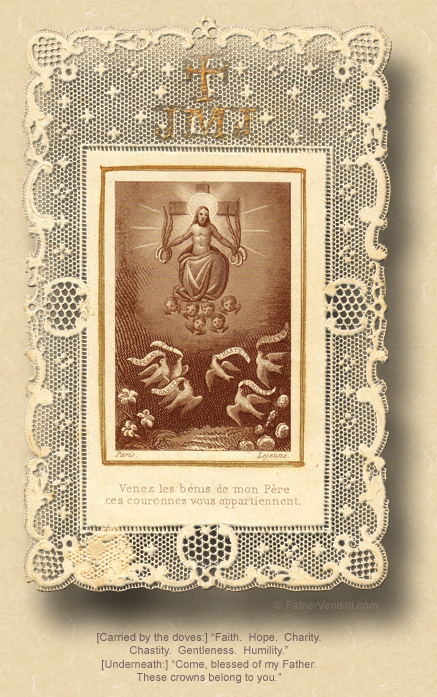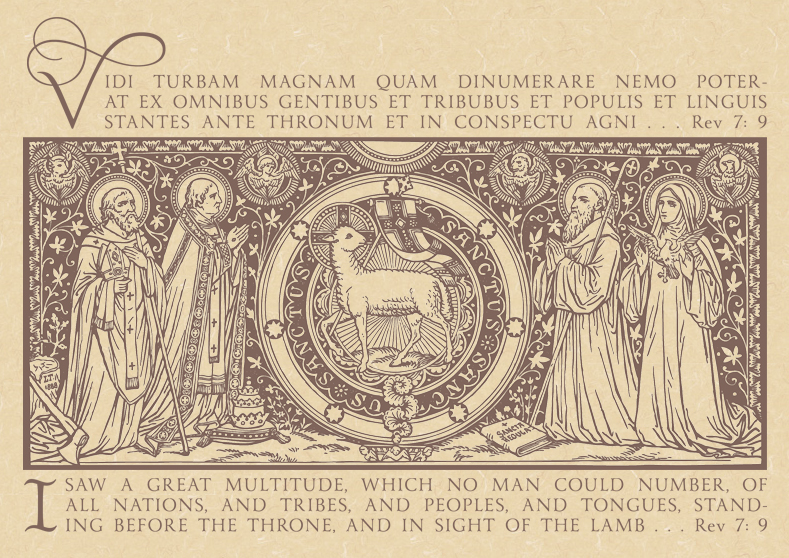Holiness: What It Is and What It Isn't.
The Solemnity of All Saints.*
Lessons from the proper, according to the ordinary form of the Roman Rite:
• Revelation 7: 2-4, 9-14.
• Psalm 24: 1-6.
• I John 3: 1-3.
• Matthew 5: 1-12.
The First Class Feast of All Saints.*
Lessons from the proper, according to the extraordinary form of the Roman Rite:
• Apocalypse 7: 2-12.
• Psalm 33: 10-11
• Matthew 5: 1-12
The Twenty-Third Sunday after Pentecost; and, the Feast of the Holy Unmercenary Wonder-Workers Cosmos & Damian.
First & third lessons from the pentecostarion, second & fourth from the menaion, according to the Ruthenian recension of the Byzantine Rite:
• Ephesians 2: 4-10.
• I Corinthians 12: 27—13: 8.
• Luke 8: 26-39.
• Matthew 10: 1, 5-8.
FatherVenditti.com
|
 6:29 AM 11/1/2015 — It is one of the forgotten teachings of our faith is that everyone is called to be a saint. Of course, it was our Lord who first said that. We don't respond to it because of the way we've mystified the saints. We romanticize their lives so much that we almost turn them into gods and goddesses to worship instead of examples to follow. But the message of the Gospel is that we are called to be saints. Holiness is for everyone: the father and husband as well as the priest, the wife and mother as well as the nun. There is no one who is not meant by God to be a saint. 6:29 AM 11/1/2015 — It is one of the forgotten teachings of our faith is that everyone is called to be a saint. Of course, it was our Lord who first said that. We don't respond to it because of the way we've mystified the saints. We romanticize their lives so much that we almost turn them into gods and goddesses to worship instead of examples to follow. But the message of the Gospel is that we are called to be saints. Holiness is for everyone: the father and husband as well as the priest, the wife and mother as well as the nun. There is no one who is not meant by God to be a saint.
Not too many years ago our late Holy Father, Saint John Paul II, canonized a man whom I think is one of our Church's greatest saints, Msgr. Josemaría Escrivá, founder of the lay organization Opus Dei. He was a priest, but he dedicated his life to showing lay people how to become saints. Saint Francis de Sales dedicated his life to the same task. And it's a hard thing to do, because so many people think that in order to be holy you have to be stuffy, boring, grave, prudish, and basically strange. Even piety by itself has little to do with genuine sanctity—people who spend their time beating their breasts, or pining away in front of statues, or praying endless Rosaries are not necessarily holier thereby. Those things can be aids to holiness, certainly; but holiness itself is something much more substantive. Living the Gospel, bearing witness to it by example—prayer, yes, but not prayers rattled off by rote; prayer to achieve union with God, prayer that focuses on the Eucharist as the center of our lives. Most important of all, the realization that God wants us to perform the tasks of our state in life as a means of sanctifying the world.
One of the greatest victories of the Devil in our time was convincing people who are inclined toward religiosity that they achieve holiness either by some sort of volunteerism or by pursuing a pseudo-clerical "ministry," as if good works by themselves constitute holiness. If we want to serve the Church in holiness it is by participating in it's mission to sanctify the world by fostering an interior life, by going to confession frequently, by learning to unite ourselves to our Lord in prayer, by constantly seeking out the Blessed Eucharist as a source of grace and an amour against immorality, and by fulfilling all the obligations of our state in life: by keeping a Christian home, by raising children in the faith, by becoming living examples of the Gospel at home, in the place where we work, among our friends. This is service to Christ and His Church, and this is holiness.
So, let us approach this Solemnity of All Saints with the realization that each of us, ultimately, is supposed to be one of them, always remembering that, while it is important to pray for the intercession of the saints, it is more important to follow their example.

* In both the ordinary and extraordinary forms of the Roman Rite, when All Saints falls on a Sunday, the Sunday texts are suppressed at Holy Mass. In the extraordinary form only, a commemoration of the Sunday is made at Lauds and Vespers.
Note: the homily for this Sunday is unusually short because Father Michael is filling in for a local parish priest in a neighboring town with two early Masses before returning to the Shrine for his regular Noon Mass. If its brevity causes you to feel deprived, you can supplement this deprivation by reading Saint Bede's excellent homily found here.
|

